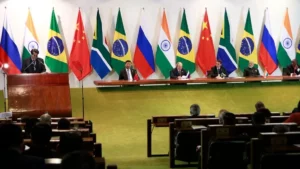GS II – International Relations

At the 11th BRICS Environment Ministers’ Meeting in Brazil, India called upon all 11 BRICS members to endorse the ‘Baku to Belem Roadmap’, an ambitious initiative aimed at securing $1.3 trillion annually by 2035 for climate action in developing nations.
What is the ‘Baku to Belem Roadmap’?
The ‘Baku to Belem Roadmap’ is a proposed climate finance mobilisation strategy bridging the period between COP29 (Baku, Azerbaijan) and COP30 (Belem, Brazil). It seeks to provide a structured pathway for scaling climate finance, particularly for the Global South, to meet the targets of the Paris Agreement.
Institutions Leading the Process
- Spearheaded by the UNFCCC COP Presidencies of Azerbaijan and Brazil.
- Supported by international coalitions, multilateral development banks (MDBs), and developing country blocs such as BRICS and the G77.
Core Objectives
- Finance Scaling:
Mobilise $300 billion in public funds and a total of $1.3 trillion per year by 2035 for climate adaptation, mitigation, and resilience. - Just and Inclusive Transition:
Facilitate equitable development pathways, especially for developing and least developed countries. - Barrier Identification:
Tackle systemic hurdles like high capital costs, lack of regulatory clarity, and limited concessional financing. - Enhanced Role of MDBs:
Empower multilateral development banks to offer increased concessional finance and risk guarantees. - Strengthening Partnerships:
Encourage joint investments from both public and private sectors to build resilient green infrastructure.
Salient Features
- Integrated Financing Tools:
Blends climate grants, concessional loans, guarantees, and private capital instruments to fund projects. - Non-Debt-Focused Mechanisms:
Emphasises the use of non-debt creating financial tools to avoid burdening developing economies. - Transparent Governance:
Incorporates a stakeholder-driven, consultative framework to ensure transparency and accountability. - Evidence-Based Approach:
Focuses on technical assessments and data-driven mapping rather than political negotiations. - Broad Inclusivity:
Welcomes participation from private players, MDBs, international donors, and developing country alliances.
India’s Role and Relevance
- India has taken a proactive stance in advocating for this roadmap within BRICS and other Global South platforms.
- Emphasises the importance of equity in climate finance, ensuring developing countries are not left behind in the green transition.
- Supports systemic reform in global financial architecture to better address climate-related vulnerabilities.
The ‘Baku to Belem Roadmap’ represents a vital opportunity to redefine global climate finance through inclusivity, innovation, and international cooperation. Its success hinges on the collective commitment of developed and developing countries, multilateral institutions, and private investors to build a climate-resilient future, especially for vulnerable nations.




